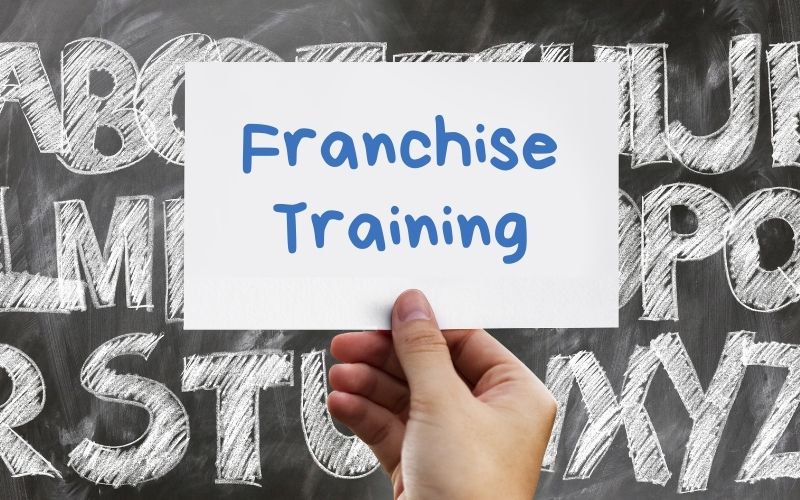Buying a franchise might be your golden ticket, if you’ve ever dreamed of owning your own business but want a little more structure than starting from scratch. It’s one of the most popular ways people jump into business ownership—without reinventing the wheel.
When you buy into a franchise, you’re not just getting a logo and a name. You’re stepping into a proven business model with built-in systems, marketing muscle, and training that can help fast-track your success. It’s like starting a business with a head start—and a playbook.
Franchising has come a long way. From fast food to home services and everything in between, there’s a franchise out there in just about every industry you can think of. And while the model comes with major perks, it’s not all autopilot and passive income. You’ve got to know what you’re signing up for.
This guide breaks down the seven key steps to franchise ownership—complete with real-world tips and important things to consider—so you can go in with eyes wide open and a strategy that works.

Franchising can be a smart, structured path to becoming a business owner—especially if you want the freedom of entrepreneurship with the safety net of a proven system. It’s a model that offers plenty of upside for franchisees, especially those looking to avoid the unpredictability of building a business from scratch.
The International Franchise Association defines franchising as a setup where an independent business owner (the franchisee) operates using the branding, systems, and ongoing support of a larger parent company (the franchisor).
In plain terms? You’re running your own business—but with the backing of an established brand and a well-oiled machine behind the scenes.
Through this setup, franchisees benefit from:
- An established brand,
- Instant credibility,
- Built-in brand recognition,
- And the trust of existing customers.
Types of Franchise Models
Franchising typically falls into one of two categories:
Product Distribution Franchises:
These are more focused on selling a franchisor’s products (think: car dealerships or soft drink distributors). You sell the brand’s goods but may not follow their entire business system.
Business Format Franchises
This is the full package and the most common type. Franchisees run a location using the franchisor’s entire business model—from marketing to customer service to operational guidelines.
When you buy into this type of franchise, you’re not just buying a name. You’re investing in a business model that’s already been tested, optimized, and replicated successfully in other markets.
Key Considerations
Brand Recognition
Joining a franchise with an established brand can give you an edge right out of the gate. That name recognition builds instant trust with customers and lowers the barrier to entry in your market.
According to Franchise Business Review, 90% of franchisees say that brand recognition was a key factor in their early success. Why? Because customers are far more likely to walk into a business they’ve heard of—and that means more foot traffic and sales from day one.
Business System
Franchising doesn’t leave you to figure things out on your own. You’re stepping into a ready-to-run business system that includes training, operations manuals, marketing support, and more.
The International Franchise Association emphasizes that business format franchising exists to keep things consistent across locations. That means no matter where the franchise operates, customers get the same experience—and franchisees get the same solid foundation.
This structured approach minimizes the learning curve, keeps service quality consistent, and ensures every franchisee is working from the same successful playbook.
Parent Company Support
One of the biggest perks of franchising? You’re not alone. Most franchisors provide ongoing support to help you succeed—from initial training to continued marketing campaigns and operational assistance.
In fact, the IFA reports that more than 80% of franchisors offer continuous resources and support. That kind of backup is a game-changer, especially in the early months of ownership when questions—and challenges—tend to pile up.
Plus, being part of a franchise network means you can connect with other franchisees for advice, support, and shared experience.
Step 2: Exploring Franchise Opportunities and Finding the Right Match
There’s no shortage of options when it comes to franchising. From big-name fast food joints to boutique fitness brands and everything in between, the franchise world is packed with opportunities. But not every franchise opportunity is created equal—and not every one will be the right fit for you.
That’s why it’s so important to choose a franchise that actually aligns with your goals, interests, and financial situation. The best partnerships happen when your passion and skills meet a proven system that works.
Sure, the top franchises get all the spotlight, but sometimes the perfect fit is a lesser-known gem that serves your community like one of the many thriving local businesses out there.
Think of this phase like dating—only instead of swiping right, you’re comparing startup costs, royalty fees, support systems, and market potential.
Start with You
Before you start scrolling through franchise directories or chasing trending brands, take a beat to look inward. What kind of business owner do you want to be? What does your ideal workday and lifestyle look like?
This isn’t just about buying into a brand—it’s about building a life and career that feels right. Whether you want to run a cozy neighborhood coffee shop or scale multiple units of the same franchise, your decision should reflect what success means to you.
Franchises can be a great way to enter the world of small businesses with support already built in. However, the magic happens when you choose a brand that makes you excited to get to work every day.
Questions to Ask Yourself When Finding the Right Franchise Opportunity
1. What kind of business owner do I want to be, and which franchises support that vision? Your business should match your lifestyle—not take it over.
2. Which top franchises or emerging brands actually match my personality and goals? It’s not just about reputation—it’s about fit.
3. What industries do I naturally gravitate toward, and what’s trending in those spaces? Passion matters, but timing and market demand matter too.
4. Is there room to grow? Could I expand into multiple locations or scale within the same franchise? Look for long-term potential, not just short-term hype.
5. Do I have the skills—and financial bandwidth—for this kind of operation? Be honest about what you can handle, and find a brand that matches that.
6. How competitive is my local market, and is there real demand for this concept? A brand might crush it in Texas but flop in your hometown. Know your turf.
7. What are the ongoing costs—like royalty fees—and how will they impact my bottom line? Numbers matter. Make sure you’re comfortable with the financial commitment.
8. What kind of support does the franchisor offer once I’m up and running? The best franchises feel like true partners, not just licensors.
9. At the end of the day, does this opportunity support the life I’m trying to build? If it doesn’t, keep looking. The right fit is worth waiting for.
Finding the right franchise is part research, part self-reflection, and a little bit of gut instinct. With the right match, you’re not just opening a business. You’re stepping into something bigger: a chance to build a life on your own terms, with a playbook that’s already been proven to work.
Step 3: Reviewing the Franchise Disclosure Documents (FDD)

Before you jump into any franchise opportunity, there’s one document you must get familiar with—the Franchise Disclosure Document, or FDD. Think of it as your franchise playbook. It lays out everything you need to know about the business—what it costs, how it runs, and what kind of support you’ll get.
This isn’t just a formality—it’s where you find out if this opportunity is really a good fit for you. Here are the sections you need to review:
Franchise Fees and Initial Investment Costs
First things first: how much is this actually going to cost? The FDD breaks down all the initial investment costs—including the franchise fee, equipment, inventory, signage, and even real estate in some cases.
You’ll want to look closely at these numbers. They’ll help you figure out how much capital you’ll need to get the business up and running—and whether it lines up with your financial comfort zone.
Ongoing Costs and Royalty Fees
Buying into a franchise isn’t a one-and-done deal. You’ll be expected to pay royalty fees, which are usually a percentage of your sales, plus contributions to things like national marketing.
These are recurring costs that support the brand and give you access to continued guidance and resources. Just be sure you’re aware of how often they come up and how they’ll affect your monthly cash flow. You want to go in with eyes wide open.
Financial Statements
Now, let’s talk about the numbers behind the brand. The FDD includes the franchisor’s financial statements, which give you a peek at how stable and profitable the company is.
This matters more than you might think. A franchisor with healthy financials is better equipped to support its franchisees and grow the brand. If the books look shaky, that’s a red flag worth digging into.
Franchise Owner Access to Support
One of the biggest perks of franchising is the support you get. The Franchise Disclosure Document spells out what kind of training, marketing help, and ongoing resources you’ll have access to as a current franchise owner.
Pay attention to this section—it’s where you’ll see how the franchisor sets you up for success. Also, don’t be shy about reaching out to previous owners. Ask why they left and what their experience was like. Their feedback can be incredibly valuable.
Step 4: Calculating Total Costs and Securing Financing

Buying a franchise isn’t just about paying the initial franchise fee and opening the doors. There are multiple layers of cost to consider—some upfront, others ongoing. As a future franchise owner, understanding these numbers early can make or break your success.
Being clear on your full financial picture will help you avoid surprises, stick to your budget, and set yourself up for long-term stability.
Types of Costs to Consider
Initial Franchise Fee and Startup Costs
The initial fee—also called the franchise fee—gives you the rights to use the brand, system, and support that come with the franchise. But that’s just the beginning. You’ll also need to budget for startup essentials like equipment, real estate, inventory, and training.
All of this is typically outlined in the Franchise Disclosure Document (FDD)—your go-to guide for understanding the true cost of launching.
Ongoing Costs
These are the regular costs that come with operating the business. One big one is franchise royalties—usually a percentage of your gross sales—which you pay to the franchisor for ongoing support and use of the brand.
You’ll also contribute to national or regional advertising efforts, plus any additional operating fees required by the brand.
Operating Expenses
Beyond what you owe the franchisor, there are everyday business costs—payroll, rent, utilities, supplies. These aren’t always listed line-by-line in the FDD, so it’s smart to talk to other owners and gather real-world numbers.
Marketing and Advertising
Most franchisors require you to contribute to a shared advertising fund. But you may also want to run your own local campaigns, so plan for extra marketing dollars in your budget.
Key Considerations
Financing Options
Not everyone has the cash on hand to cover all these costs—and that’s okay. Many franchise owners use financing to bridge the gap.
You can go the traditional route with a bank loan (solid credit and collateral required), or look into SBA loans, which often come with better terms for small business owners. Some franchises also offer their own in-house financing, which may be more flexible.
Compare your options. Look at interest rates, repayment schedules, and what kind of paperwork each lender requires.
Budgeting for Ongoing Costs
It’s easy to focus on the upfront fees and forget about what it takes to keep the lights on. Make sure to budget for recurring costs like franchise royalties, advertising, payroll, and maintenance.
Those royalty fees—often based on your gross sales—can eat into your profits if you’re not tracking them closely. A strong monthly budget can help you stay on top of cash flow and avoid financial stress.
Gross Sales Projections
You’ll want to know what kind of revenue you can realistically expect. The Franchise Disclosure Document will often include historical sales figures to give you a starting point.
Look at how other franchisees—especially those in similar locations—are performing. Talk to them directly if you can. Don’t just rely on best-case scenarios. Build your projections based on your local market, competition, and customer demand.
Step 5: Assessing Franchise Agreements and Franchise Law Compliance

Before you officially join a franchise system, you’ll need to go through the franchise agreement—a legally binding contract between you and the franchisor. It lays out everything from your day-to-day responsibilities to the support you can expect from the brand.
This isn’t just paperwork. It’s your rulebook for franchise ownership, so it’s critical to read every word carefully.
It covers your rights to use the brand, rules for setting up your franchise location, and the ongoing support you’ll receive as a franchise owner. It also includes your financial obligations—like franchise fees, royalties, and your initial franchise fee.
Because this contract is dense and full of legal language, it’s smart to have a franchise attorney walk you through it. Understanding the legal side of your business upfront will help you avoid bigger issues later.
Key Considerations
Brand’s Trademark
The franchise agreement gives you the right to use the franchisor’s name, logo, and branding materials. This is a major part of the value you’re buying into—you’re joining a brand that’s already recognized and trusted.
But there are rules. The agreement will explain exactly how the brand should be represented to keep things consistent across all franchise locations. Stick to these standards, and you’ll benefit from the brand’s built-in reputation.
Franchise Location Requirements
Not every location is created equal. The agreement may outline specific requirements for your franchise location—things like size, layout, nearby businesses, or even parking availability.
Some brands will also protect your territory, meaning other franchise owners from the same franchise can’t open too close. All of this is designed to give you the best shot at success and to protect the brand’s image in the market.
Ongoing Support and Training
One of the biggest reasons people choose franchising over starting from scratch is the support. Your franchise agreement should clearly lay out what kind of help you’ll receive—from startup training to marketing materials and operational guidance.
Good franchisors keep investing in their franchise owners. Ongoing training and resources can make all the difference when it comes to growing your business and staying competitive.
Franchise Fees and Royalties
Let’s talk numbers. The agreement will detail your franchise fee (also called the initial fee)—the amount you pay up front to join the system and access the brand’s tools and reputation.
After that, you’ll likely pay franchise royalties, which are usually a percentage of your gross sales. These fees go toward supporting the brand’s infrastructure and services, like marketing campaigns or technology platforms.
Make sure you understand what’s due, when it’s due, and what you get in return.
Step 6: Evaluating Franchisor Support and Training Programs

In the franchise industry, the level of support you receive can make or break your business. A successful franchise usually comes with strong training and ongoing assistance from the franchisor.
Great support isn’t just a bonus—it’s part of what you’re paying for. It helps you stay consistent with the brand, run a smooth franchise operation, and keep customers coming back.
Types of Support to Look For
Initial Training Programs
These programs help franchise owners hit the ground running. You’ll learn the ins and outs of the business—from how to deliver great customer service to how to manage day-to-day operations.
This training builds confidence and gives you the tools to open your franchise location with clarity and direction.
Ongoing Support
Support doesn’t stop after opening day. Franchisors often provide continuous help with marketing, operations, and tech. You might get regular check-ins, performance reviews, and updates on industry trends.
This kind of hands-on guidance is especially helpful if you’re a small business owner new to the franchise world.
Marketing Materials and Advertising Campaigns
Many franchises offer ready-to-use marketing materials—flyers, digital ads, social posts, and more. On top of that, franchisors often run national advertising campaigns that benefit the entire system.
This saves time and lets you focus on connecting with your local audience while still tapping into broader brand awareness.
Franchisee Access to Resources
Most franchisors have an online hub where you’ll find training modules, operations manuals, and marketing guides. These platforms help you stay updated and aligned with brand standards.
Talking to other franchise owners can also offer valuable insight into the kind of support you can expect. Their experience might show you how to make the most of what the franchisor provides.
Step 7: Setting Realistic Expectations and Planning for Long-Term Success

Franchise ownership isn’t a get-rich-quick plan. It takes hard work, patience, and time—sometimes nearly a decade—to build a strong business. It’s important to go in with your eyes open.
Even with a proven system, there’s no such thing as guaranteed success. The most successful owners are in it for the long haul.
Long-Term Success Strategies
Growth Strategy
If you want to grow, you need more than just ambition—you need a game plan. Think about your next move. Will you offer new services that complement your current lineup? Open a second franchise location? Expand into a nearby market that’s underserved?
Growth doesn’t have to mean going big right away. It’s about being intentional. Map out your short- and long-term goals, set timelines, and measure progress. Scaling smart helps you stay aligned with the franchisor’s standards while still moving your business forward. And remember—slow, strategic growth often beats rushing into expansion and burning out.
Adaptability
The franchise industry moves fast. Consumer trends shift. Competitors evolve. Technology changes the game overnight. What worked a few years ago might already be outdated.
That’s why the most successful franchise owners stay flexible. They adapt quickly, listen to their customers, and keep an eye on what’s happening in the market. Whether it’s updating your menu, rethinking your services, or shifting how you market, being open to change can help you stay one step ahead. Think of adaptability as your secret weapon—it keeps you relevant.
Customer Retention and Repeat Business
Winning customers is great. Keeping them is even better. The backbone of any successful franchise is its loyal customer base. Repeat business is what keeps the lights on and the cash flow steady.
That starts with delivering great service every single time. But it doesn’t end there—build relationships. Personal touches, loyalty programs, birthday emails, and a friendly “we missed you” message—these small things make a big impact.
The goal? Turn one-time customers into lifelong fans who keep coming back and tell others about you. When your service is memorable, your marketing budget doesn’t have to work as hard.
Ongoing Costs and Operating Expenses
Let’s be honest—franchise ownership isn’t cheap. Beyond the franchise fee, you’ll be managing ongoing costs like royalty payments, payroll, supplies, utilities, and those sneaky unexpected repairs that always seem to show up at the worst time.
To stay on solid ground, you’ll need a tight grip on your finances. Monitor your cash flow monthly—weekly, if possible. Set money aside for emergencies. Adjust your budget when needed. A smart financial strategy helps you avoid the all-too-common scramble to cover costs. It also frees you up to focus on growth instead of just staying afloat.
Final Thoughts: Taking the Leap into Franchise Ownership
Buying a franchise isn’t just a business move—it’s a life decision. It takes research, planning, and a clear understanding of what you’re signing up for. Diving into the franchise model, reviewing the Franchise Disclosure Document (FDD), and budgeting for real-world costs are essential first steps. Analyzing the franchise agreement then helps lay the foundation for long-term success.
Becoming a franchise owner can be one of the most rewarding ways to step into business ownership. You’re not starting from scratch—you’re plugging into a proven system with built-in brand recognition and support.
That said, it’s not a shortcut to guaranteed success. Like any small business owner, you’ll need to show up every day ready to solve problems, serve customers, and grow your operation.
The process can feel overwhelming at times, but you don’t have to go it alone. Talk to a franchise consultant or legal advisor who can walk you through the fine print, especially when reviewing your franchise agreement. Getting the right guidance early can save you major headaches later.



